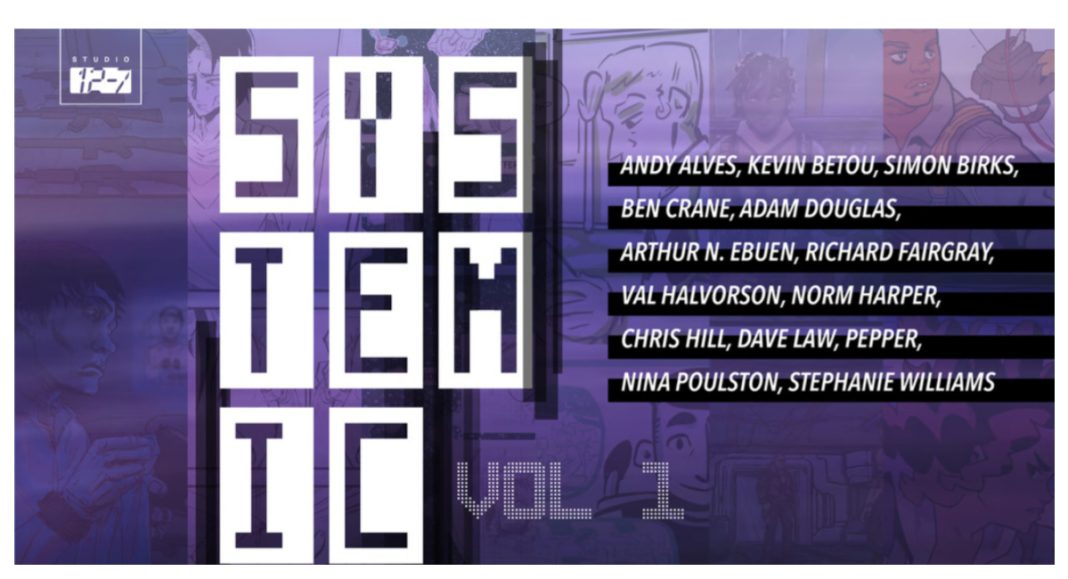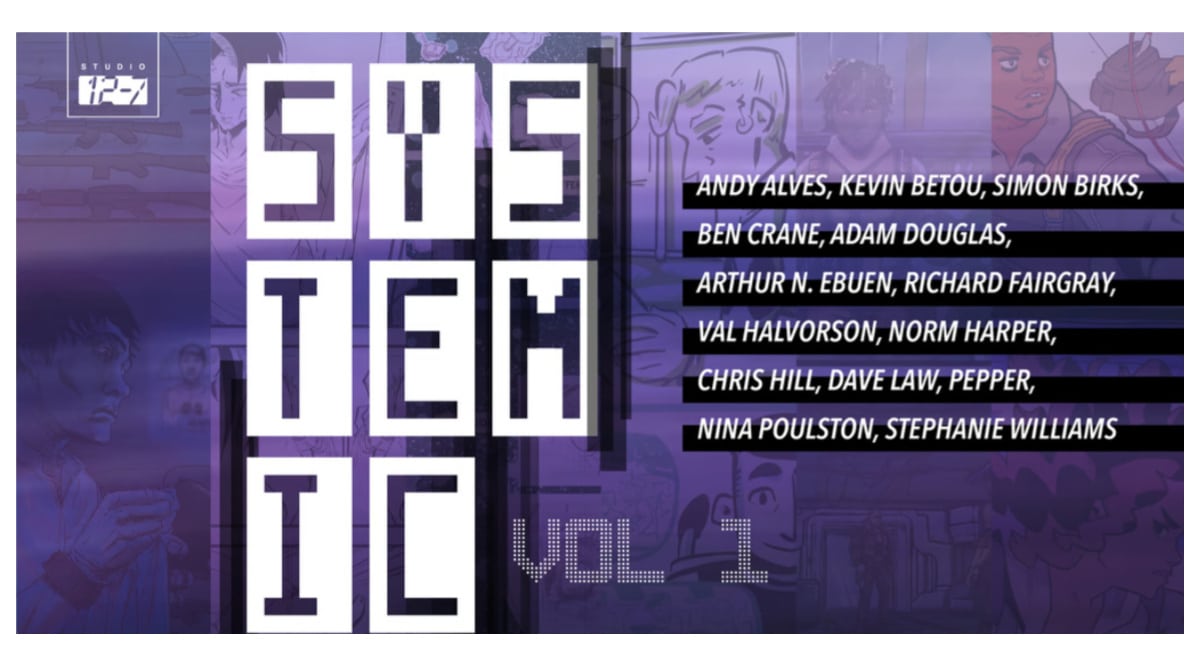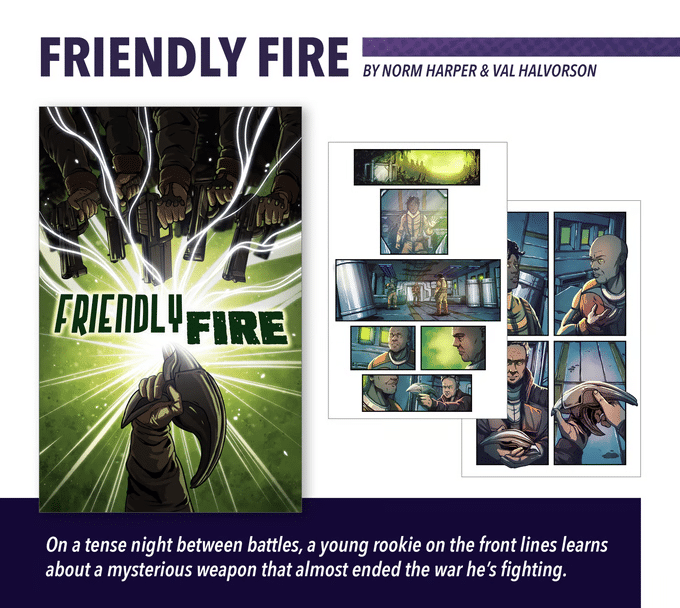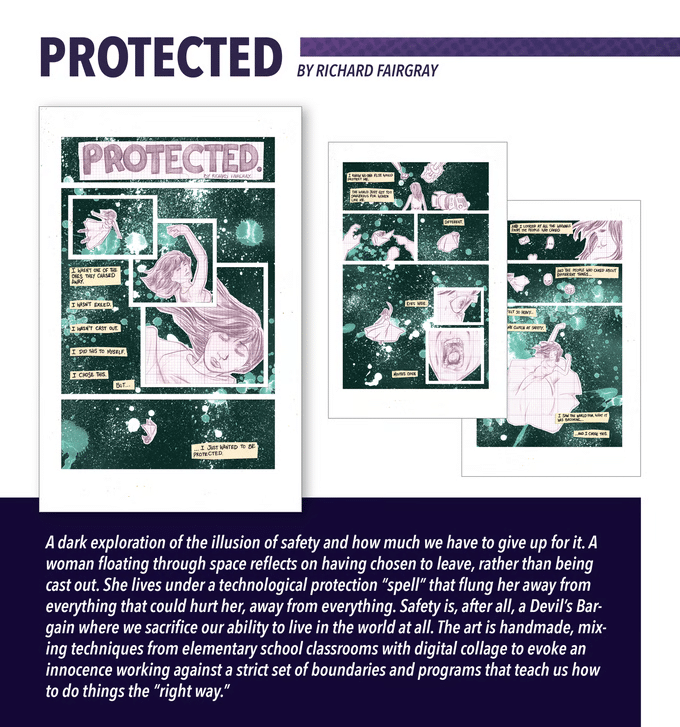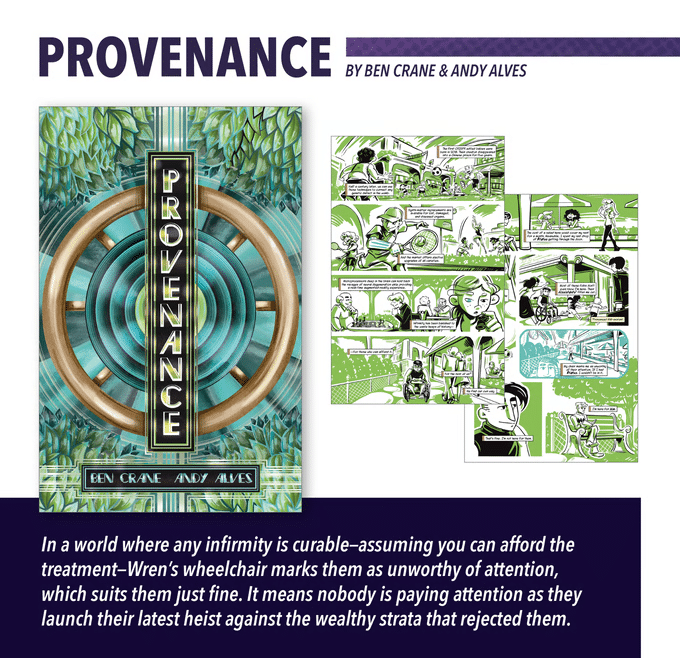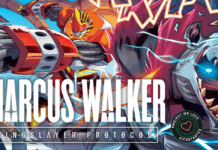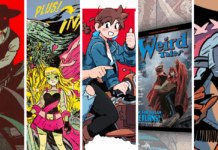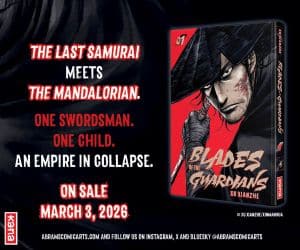Creators Arthur N. Ebuen and Ben Crane are in the final days of their crowdfunding campaign for Systemic vol. 1, a sci-fi comics anthology that “collects intimate stories of individuals caught where society’s largest forces collide,” brought to life by a mix of rising and established creators from both indie and mainstream comics and now available for preorder on Kickstarter.
We caught up with project creators Ebuen and Crane to learn more about what went into the anthology, from its careful story curation to the vision behind the project, and how these personal, human-focused tales explore the systemic forces shaping our world.
DIEGO HIGUERA: Systemic Volume 1 brings together six stories across 72 pages, all centered on the intersections of personal narratives and larger social force forces. What was the starting point for this anthology?
ARTHUR EBUEN: Actually, breaking news as of this morning, it’s no longer six stories. We have seven stories, and we just now added Simon Burks from Blue Fox Comics. He’s also the talent Talent Search winner for Top Cow, who wrote Antarctica.
Simon is contributing a story with Nina Poulston! So we just found out this morning that he’s officially on board, and sent us the story, and it looks amazing, and they’re both gonna knock it out. So it’s gonna be another star to add to our lineup. So, pretty excited about that.
HIGUERA: That’s fantastic. What was the starting point?
EBUEN: I had a side story that I had written just kind of for myself. I think we talked about this at the last podcast for California Inc.
When California Inc first came out, I never thought I’d get past issue one, and then our readership grew through issue four, and it was a four-issue story, and it was done, but our readers wanted more. It’s kind of cool; it was an excuse for me to write this 36-page story that I have, but doing it all in one big volume would be tough for me at the time.
So, I decided to break up a story into three acts of 12 pages. And Ben said out of nowhere, “Hey, I have a side story that I have written too.”
CRANE: Right. I usually write long-form, full graphic novels or prose novels. I was between projects and wanted to experiment with shorter work, so I wrote a short sci-fi comic. I loved it, but as a one-off, it didn’t have a home. I reached out to my network to see if anyone was building something it might fit into, and Arthur said he had something too.
Our stories were very different, but we realized they shared a common theme: people trapped within forces larger than themselves. Arthur brings incredible experience with design, Kickstarter, and publishing through his Studio 127 banner, and my background is in film development. I spent 12 years working with creative teams to shape stories for the screen. Between the two of us, we thought: why not build a book together? We had talented friends, so we invited them in. That’s how Systemic was born.
EBUEN: To our surprise, people were quick to say yes. In some cases, creators even asked if they could join after hearing about it through the grapevine. It’s been humbling, and personally I’m honored to collaborate with Ben, whose work I really admire.
HIGUERA: Even now you’re announcing new contributors. What was that like?
EBUEN: Honestly, a bit of a forehead-slap moment, we should have reached out to Simon earlier since he’s a mutual friend. But he came to us with a story and we couldn’t say no.
Stephanie Williams is another example. She’s incredibly busy; she’s everywhere right now, with Marvel, DC, IDW, Mad Cave, you name it. Because she’s a friend, I just thought, “let me just reach out. She’ll say no but it’s worth a shot.”
When we saw each other at HeroesCon, Stephanie hadn’t responded yet to my email. I went to go say hi, and Ben happened to walk by. She said, “Oh, by the way, I’d love to do your anthology.” Get out of here, You’re going to do our book?
Ben had asked 10 minutes before if I had reached out to Stephanie. I was like, “Yeah, why is that a big deal?” She’s kind of a big deal, but [in my mind] she’s just a friend, and then I had started to look through her accolades, and it hit me, “Oh yeah, my friend is a huge deal.”
CRANE: It was really a lovely moment when she agreed. Her story is absolutely fantastic. I’m so, so excited to get to share it with people. Every story in this book, I’m just thrilled to have been a part of it, and to have been able to help bring it out and share these stories with people.
HIGUERA: That leads into my next question. Short story anthologies can sometimes feel fragmented, but this anthology feels tightly bound by theme. How did you shape the guiding vision so the stories complemented each other?
EBUEN: I’d give that credit to Ben.
CRANE: When I was working in film, pretty much my entire career, I worked for a producer — the same guy for 10 years, Stanley Mason Neufeld — who was absolutely legendary. He made all the Jack Ryan movies. I started working for him when he was doing Shadow Recruit, and so I did work on that. I did work on the Jack Ryan TV show.
But he had a decades-long career, and he worked with everyone in Hollywood. Every name that you can think of, he’s worked with them, and they all loved working with him. Getting to watch him work, it was very clear why. His philosophy was, surround yourself with talented people and then get out of their way.
That’s very much the approach that I took in development work. It’s very much the approach that I take in editorial work now. Every team that we have on this book, I had absolute faith, before we saw anything from them, that they were going to turn in something fantastic. So, we crafted a brief that was targeted and specific, but open to wide interpretation, which was this idea of: we want personal stories. It has to be about a single person. It has to be about an individual; we’re not looking for stories about a massive culture. But that person needs to be dealing with forces that are larger than them, and forces that are systemic.
Within that, we just said, go wild. Whatever this sparks in you, whatever story this inspires in you, that’s the one that we want to tell, and that’s the one that we want to help you shape and bring out.
Every single one of them came back with something that was wildly different from what everyone else had done. But because we had been so specific in the brief, they all fit. They all turned in stories about individual people trapped between forces larger than they are, and dealing with these systemic issues that grind against each other and grind against the people that live underneath them. So it was very easy to corral everything into that singular focus, because we’d done the work ahead of time of making sure that everyone was pointing in the right direction, so that then once we had the stories, they worked.
EBUEN: Ben’s prompt in the end was just so pointed, but opened up such a big, wide set of parameters to plan. It’s so cool, the gamut of stories that we got. It’s like night and day between so many of them, but that through line does definitely show through. And all seven stories.
HIGUERA: Your lineup includes Eisner-nominated and GLAAD Award-winning creators alongside newer voices. How did the roster come together, and what unites their approaches?
EBUEN: I can talk about how we connected with him, but Ben, if you want to talk about the story?
Fortunately, Ben and I are friends with lots of these creators already, like Norm Harper and Chris Hill. I’ve met them through the Saturday morning call with Fanbase Press. They have this open link, anybody in the creative space within comics, actually anybody can call in, and it’s just a place for us to meet on a Saturday morning at 10 Pacific Time and just chat.
I’ve met a lot of writers that way, and we see each other at cons. So we were able to reach out to someone like Norm, who is the Eisner-nominated writer, and then Chris, who’s a buddy on that call as well, who’s gotten so many issues of Rapture Burgers out. So it was good to tell somebody who’s done so many comics already.
CRANE: He’s made enough that they just put out the hardcover election of the first volume, which is a beautiful book as well, that people should go check out.
I also want to celebrate Fanbase Press. They do so much. They put out great books, but they also do so much community building. When I first started getting into comics creation, that community that they had already built was so welcoming. A lot of the people in this book are people whom I’ve met through that community, and then people who Art has met at conventions.
I mean, one of the great things about comics, to me, is that we all know none of us are going to get rich doing this. We’re all here because we love making comics. If you bring that energy, if you show up and just say, I’m excited to make comics, and I’m excited to read the comics that you’re making, then people will respond.
So when we started reaching out to people, saying, hey, we’re putting a book together, would you be interested in contributing, and people responded. That was really, really gratifying to see.
EBUEN: The enthusiasm was what struck me most. People were genuinely excited to contribute, and that was really validating.
My community for comics, I’m on year two and a half now, has grown mostly because of them. The people they introduced me to at cons, through these calls, at their meetups, they’re just so giving. That goes to both Brian and Barbara. I don’t know where they find the energy, because I know they have full-time jobs, and they’re parents of twins, and they do Fanbase, and their publishing, and they’re doing podcasts. It’s just amazing, the amount that they give.
I hope to give back as much as they give to us, and I’d like to hope that we give back to them.
HIGUERA: When you’re telling science fiction stories that explore big ideas, how do you balance those larger concepts with the intimate, personal stories that make them resonate, especially since this project is centered on systemic issues?
EBUEN: Mine personally comes from my own experience. I lost my mom at an early age, so that’s kind of a driving force behind my story, having to deal with the anger that you feel inside you because you don’t know where to put that feeling. Feeling it as you turn into anger, at least at the age when I lost my mom, that is a driver for me that I could personally connect with.
I think everybody has dealt with loss in some way or form, and how they dealt with it is always different. But there’s an amount of frustration with trying to figure out that chemical reaction happening in your body, and how to rectify that, and deal with it mentally. Saying, “I’m okay to feel this way. Why do I feel this way?” But, don’t spin out, you know?
So that’s something that, at least for me, connects with me. I think especially of the way the world is going these days. People don’t give themselves the room to have feelings as much as they say they do. That’s kind of how I try to approach this.
CRANE: For me, part of the power of science fiction is that by moving a story out of our direct world, we can be far more overt and direct in what we’re trying to say. You can really approach something head-on and focus on exactly what it is that you’re trying to explore in science fiction, in a way that in literary fiction or non-genre fiction, you wouldn’t necessarily be able to get away with.
There’s a quote I heard from John Hodgman — I don’t know if he’s the first person to say it, but that’s where I heard it, so I’m going to give it to him — “Specificity is the soul of narrative.” It is the small details that sell the humanity of a story.
One of the reasons that, in the brief for this anthology, we were so specific that we wanted it to be about individual people was because we didn’t want to get lost in just world-building and just “here are all my big ideas.” There’s definitely a place for big ideas; big ideas are great, and science fiction needs big ideas. But when you’re dealing with an extremely limited page count, you need to get to the human side of the story quickly.
Focusing on that one person, making sure the story was very, very specific to a single human, can help, paradoxically, make the story more universal.
EBUEN: I’ve heard that from my editor, Justin, too. He says people think that if they write something broad, it’ll get everybody, but actually, it’s the opposite. The more specific you get, exactly like you said, the more relatable it is to the other person. They’ll find their way to relate to it because they’ve done their own version of it.
So again, my mom passed when I was 16, but that’s not specific to this story. But then it’s about loss, so people can get that. It’s interesting how real that actually is.
You could watch something that’s got dragons. We don’t have dragons, but when something happens to that character in a certain way, like they were backstabbed by somebody, you may have experienced being backstabbed. You have that oh moment, that feels like you get it.
HIGUERA: That’s fantastic. I think it’s a really good idea to focus on these personal connections, especially with everything going on. I also wanted to ask, with the campaign running from September 2 to 20, 2025, what do you hope readers and backers take away from supporting Systemic during that time? Do you want to give any clues about the project?
EBUEN: One of the big things for me and Ben is that this is creator-owned, so all the profits go directly to our pockets. A lot of us are doing this, technically losing money, and going into it.
Every single team is spending their own money to make these stories come alive. If we at least fund the project, we’ll break even. Any extra money goes directly into the pockets of the creators. Hopefully, that allows us to do Systemic Volume Two, Volume Three, and attract more creatives to bring in more stories.
As Ben said, we’re not in it for the money, but it helps. We just want our stories to come alive. The funds go evenly to everyone, and that only happens if we at least break even. If we exceed that, there are stretch goals for upgrades to the books, which is great. Extra funding also helps us plan future volumes, second, third, fourth, fifth.
CRANE: Exactly. There was never a question; the profit split is equal. Seven teams, seven shares. For us, this isn’t just about telling stories of systemic forces; it’s about building a better system behind the book itself. Supporting Systemic means directly supporting the creators.
Don’t miss your chance to support this thoughtful and ambitious collection before the campaign ends! Check out the campaign here!


